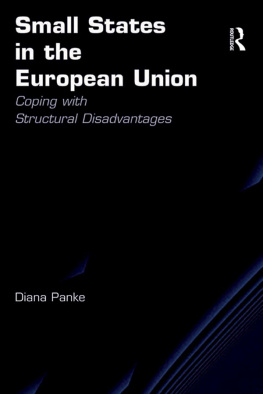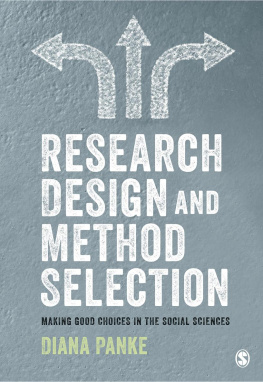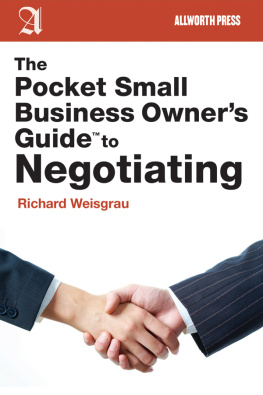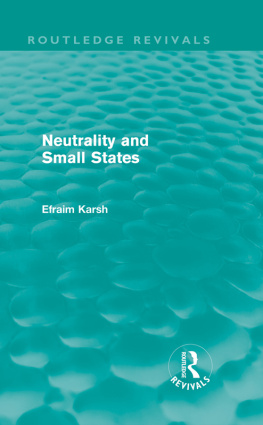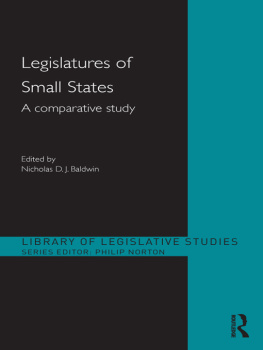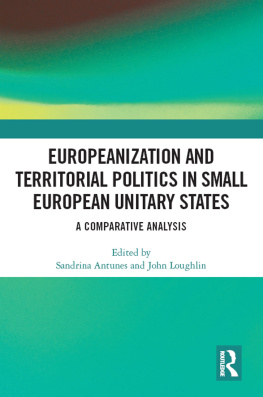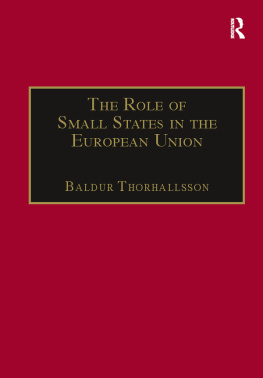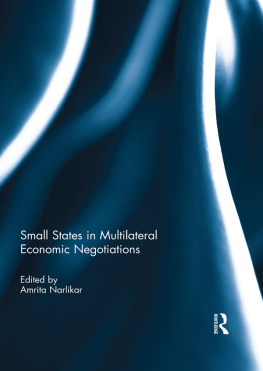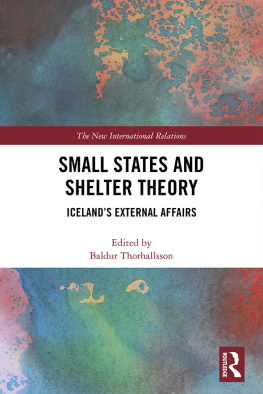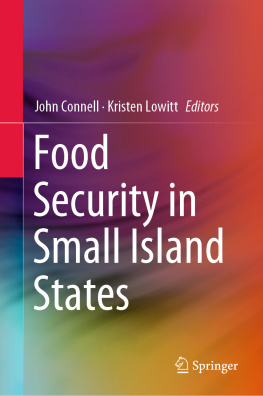SMALL STATES IN THE EUROPEAN UNION
Small States in the European Union
Coping with Structural Disadvantages
DIANA PANKE
University College Dublin, Ireland
First published 2010 by Ashgate Publishing
Published 2016 by Routledge
2 Park Square, Milton Park, Abingdon, Oxon OX14 4RN
711 Third Avenue, New York, NY 10017, USA
Routledge is an imprint of the Taylor & Francis Group, an informa business
Copyright Diana Panke 2010
Diana Panke has asserted her right under the Copyright, Designs and Patents Act, 1988, to be identified as the author of this work.
All rights reserved. No part of this book may be reprinted or reproduced or utilised in any form or by any electronic, mechanical, or other means, now known or hereafter invented, including photocopying and recording, or in any information storage or retrieval system, without permission in writing from the publishers.
Notice:
Product or corporate names may be trademarks or registered trademarks, and are used only for identification and explanation without intent to infringe.
British Library Cataloguing in Publication Data
Panke, Diana.
Small states in the European Union : coping with structural disadvantages.
1. States, Small. 2. Decision making--European Union countries. 3. European Union countries--Politics and government.
I. Title
341.2'422-dc22
Library of Congress Cataloging-in-Publication Data
Panke, Diana.
Small states in the European Union : coping with structural disadvantages / by Diana Panke.
p. cm.
Includes index.
ISBN 978-1-4094-0528-3 (hardback) 1. European Union. 2. European Union--Membership 3. States, Small. 4. European Union countries--Politics and government. I. Title.
JN30.P365 2010
341.2422--dc22
2010016348
ISBN 9781409405283 (hbk)
Contents
List of Figures
List of Tables
Preface
Since I am from Germany, which is undoubtedly one of the bigger European states, one might wonder why someone like me studies the role of small states. When I started my new job as a lecturer in the School of Politics and International Relations at University College Dublin in 2007, I was looking for a new research project to keep me busy for the next couple of years. Suddenly living and working in Ireland, I thought of potential projects that might also be of interest to my new colleagues. Since I am not at all an expert on Irish politics, I began to think what is Ireland an instance of?, and came up with the answer it is a small state. Given that my research interests are in international relations and EU studies, the vague small states idea quickly evolved into a study of the role of small states in negotiations beyond the nation-state. This book is a product of my research project Small States in the European Union. Coping with Structural Disadvantages, which was funded by the Irish Research Council for the Humanities and Social Sciences (IRCHSS).
For helpful comments on this project I am especially grateful to Andreas Dr, Ole Elgstrm, Jos Elkink, Jhanna Jnsdttir, Brigid Laffan, Daniel Naurin, Diane Payne, Thomas Sattler, Nicole Simonelli, Julie Smith, Daniel Thomas, Baldur Thorhallsson, Cornelia Woll, and Andreas Wrantjen. In addition, I would like to thank everyone participating in the panels in which I presented bits and pieces of the project during the APSA, EUSA, ECPR, ISA, BISA and PSAI conferences in the last two years. My thanks also goes to the participants of research colloquia of the Dublin European Institute, the Queens University in Belfast and the Dublin City University, the participants of the Cambridge workshop on small states, the Trinity College workshop on the EU as well as my former colleagues from the Free University of Berlin for all their constructive suggestions.
Special thanks goes to the staff working in ministries and permanent representations of the EU member states for filling out the survey and for volunteering for interviews. Although they have heavy workloads, many of them devoted a considerable amount of time to support the project, for which I am extremely grateful. Without their help, this research project could not have been carried out.
Last but not least, I would like to thank my research assistants Lisa Ahles, Jos Canto, Conor Feighan, Natalie Manning, Stephen Massey, Susanne Mulcahy, Paul Quinn, and Michael Verspohl for all their good work that they contributed to different stages of the project.
List of Abbreviations
Agri | Agricultural Policy |
AOB | Any other business |
AT | Austria |
BE | Belgium |
BG | Bulgaria |
CoE | Council of Europe |
COM | European Commission |
COREPER | Committee of Permanent Representatives |
CY | Cyprus |
CZ | Czech Republic |
DE | Germany |
DG | Director Generals |
DGE | Directorate General for the European Union |
DK | Denmark |
EC | European Community |
Eco | Economic Policy |
EE | Estonia |
EEC | European Economic Community |
EFSA | European Food Safety Authority |
Envi | Environmental Policy |
EP | European Parliament |
ES | Spain |
EU | European Union |
EVA | European Vodka Alliance |
FI | Finland |
FiMe | Financial Means |
FR | France |
GDP | Gross Domestic Product |
GMO | Genetically Modified Organisms |
GR | Greece |
H | Hypothesis |
HU | Hungary |
IE | Ireland |
IEA | International Energy Agency |
IFAD | International Fund for Agricultural Development |
IGC | Intergovernmental Conference |
IMCO | Committee on the Internal Market and Consumer Protection |
IMF | International Monetary Fund |
IR | International Relations |
IO | International Organisation |
|

